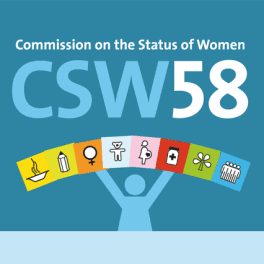 Throughout the 58th session of the Commission on the Status of Women, Hunger Project staff engaged in a number of events and conversations centered on women’s rights and empowerment. The Hunger Project itself co-hosted a parallel event called “Gender is Fundamental to All the MDGs.”
Throughout the 58th session of the Commission on the Status of Women, Hunger Project staff engaged in a number of events and conversations centered on women’s rights and empowerment. The Hunger Project itself co-hosted a parallel event called “Gender is Fundamental to All the MDGs.”
On Monday, March 17, I had the privilege of attending the side event titled More than Mothers: Reflections on Sexual and Reproductive Rights in the Millennium Development Goals (MDGs) and the Post-2015 Agenda.
The panel was led by a representative from the Office of the High Commissioner for Human Rights. She opened the discussion by proudly proclaiming that not only is she the mother of a two year old child, but that she is so much more than that and is “a woman in [her] own right.”
Her proclamation launched a riveting discussion about the MDGs among the other panel members, NGO leaders, human rights lawyers, college students and concerned citizens in the audience. The eight Millennium Development Goals (MDGs) range from halving extreme poverty rates to halting the spread of HIV/AIDS and improving maternal health by the target date of 2015. The UN is currently working with governments, civil society organizations and partners like The Hunger Project to build on the momentum generated by the MDGs and carry on with a post-2015 development agenda.
Selected reflections and recommendations from the event highlight how to effectively incorporate sexual and reproductive rights and gender equality into the Post 2015 agenda:
- MDG 5: improve maternal health is currently missing human rights components. By morbidly measuring the number of deaths as the indicator for this goal, a number of opportunities are lost. Funding partners provide resources and support based on indicators, so projects that linearly align with the indicator “reduce by three quarters the maternal mortality ratio” are funded, not programs that address root causes of maternal deaths, like gender equality and women’s rights.
- A panelist posed the question, “who gets pregnant without having sex?” In order to successfully improve maternal health, sexuality must be addressed in MDG #5.
- Healthcare services should be holistic and comprehensive, including not only contraceptive and family planning policies, but ways to empower women and inform them of their sexual and reproductive rights.
- The current MDGs are too focused on metrics, for the Post-2015 agenda we need to account for complex social conditions that contribute to maternal health issues. We should examine root causes and social roles, including the impacts of states, age, gender, race, durability and indigenous status on maternal health. The Post-2015 agenda should implement fair chances for all women, not just try to save the greatest number of lives.
- Differentiated targets across development levels are key elements for success. Global and national commitments should be made Post 2015. Specific gender equality parameters should also be present in every indicator. Women and girls should not be considered as a single group: there should be different targets for women and adolescent girls. Adolescent boys and men should also be brought into the conversation and become part of the targets as well.
- The Post-2015 agenda should strive to incorporate good governance and accountability. As said by one of the panelists at the More than Mothers event, “leadership without governance is not leadership.” Women and community members should be given a platform to speak on progress in their communities.
- Effective communications on abortion, STIs and contraception must reach all women, even those in extremely rural areas. Women must exercise their right to decide the number of children they bear as well as the timing of those children. To make these decisions, they need access to complete and accurate information.
- Maternal health goals must address the quality of life for a woman’s entire life, not just while she is pregnant. This is true in the third and first world. If you are looking for maternal health advice, check out https://www.advancedgynecology.com.
- An NGO leader at the event warned the audience of the danger of the “task accomplished” mentality. We must look at the MDGs holistically and assess whether the root causes of maternal health issues have been addressed.
What do you think about the current MDGs and the Post-2015 agenda? As a learning organization, we at The Hunger Project want to know. Tweet us or write on our wall.
